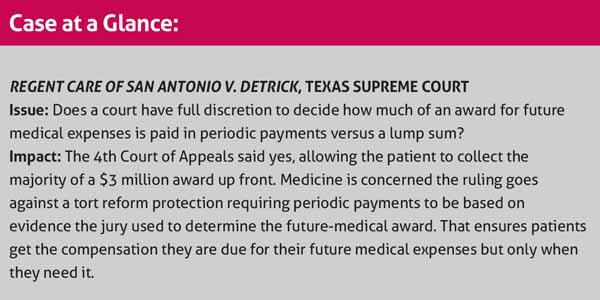
A piece of Texas’ landmark 2003 medical liability reforms is up in the air.
If physicians or other health care practitioners lose a negligence case and have to pay future medical expenses, they can ask the court to break down that award into periodic payments – rather than paying the whole amount at once. By law, the court has to grant that request, “in whole or in part.” That was one of the protections of tort reform intended to make sure injured patients get compensated for their upcoming medical care, but only when they actually need those funds.
But what kind of latitude does that language give the court? Can it rule that any portion of award for future medical costs should be paid in installments, and the rest in a lump sum?
An appeals court has essentially said the answer to that last question is “yes.” That ruling troubles the Texas Medical Association.
The skilled-nursing facility on the losing end of that decision, Regent Care of San Antonio, has taken its dispute over the issue to the Texas Supreme Court after a trial court put the facility on the hook for paying the vast majority of Robert Detrick’s $3 million future medical award as a lump sum. A little over a year after the court made that decision, Mr. Detrick died.
TMA signed on to a friend-of-the-court brief with the Texas Alliance for Patient Access (TAPA), the Texas Hospital Association, and others to support the nursing facility and make sure future medical expenses aren’t paid for care that never occurs. Edinburg internist Linda Villarreal, MD, chair of TMA’s Board of Trustees, said TMA needed to get involved to make sure courts comply with the intent of tort reform.
“The idea behind that was to make sure that our patients were taken care of, and that in addition to that, that the payments would be in a timely manner to where they would be available funds, rather than issuing a lump sum,” she said.

Regent: “No basis” for a lump sum
According to court documents, Mr. Detrick and his wife, Carolyn, sued Regent Care of San Antonio and several other defendants, including Mr. Detrick’s physicians, a radiologist, and a radiology company. The suit was over medical care that Mr. Detrick received in 2013, when he was in his late 70s. The defendants other than Regent settled for a combined $1.85 million. Ultimately, after trial, a Bexar County district court awarded Mr. and Mrs. Detrick just under $3.4 million, including $3 million in future medical damages.
Regent asked for a court order that all the future medical damages be paid in installments, but the court ordered only $256,358 of that amount to be in periodic installments – leaving about $2.7 million to be paid in a lump sum. The periodic-payments issue was one of several that Regent challenged when it appealed the trial court’s decision to the 4th Court of Appeals.
Appellate justices agreed with the trial court on periodic payments, saying, “The determination of the amount to be paid periodically is within the trial court’s discretion.” It said Regent’s argument that the trial court was required to order the entire $3 million be paid in installments “is contrary to the plain language” of the law.
Regent pursued its challenge to the state Supreme Court. By law, Regent points out in a filing, the periodic payment of future medical expenses is “mandatory upon request, and trial courts must find the dollar amount that will compensate the claimant for future damages. If there is no basis in the record for an immediate payment of future damages, then such order is improper.”
Regent also says in court documents that the Detricks’ own experts testified that Mr. Detrick’s life expectancy was between four and eight years, and the Detricks stated in a trial exhibit that the cost of his future medical care amounted to $250,000 annually.
“There is no basis for this lump-sum award” of $2.7 million, Regent’s filings say. “For example, a trial court could find that immediate payment is needed to accommodate immediate needs such as home modifications, and thus order the remaining future damages paid periodically. But that is not the case here.”
According to court documents, Mr. Detrick died in November 2018, 16 months after the trial court’s judgment.
In this case, the patient and his family “basically argued to the [trial] judge that the judge has complete and unfettered discretion to do whatever he wants,” Angie Olalde, an attorney for Regent, told Texas Medicine in an interview. “Under that argument, you could order a dollar [to be paid in periodic payments] out of a $3 million future-medical payment award. For that reason, we think, ‘No – the statute requires the trial court to make a finding, and findings always have to be based on the record.’”
TMA backs Regent
In the friend-of-the-court brief TMA and TAPA filed with the Supreme Court in January, TMA agrees with Regent. The document outlines a seven-step process a court should take to award future medical damages in periodic payments, according to TMA and TAPA’s interpretation of the law. Part of that process is assessing the evidence the jury considered in awarding a total amount for future damages. Determinations of lump sum awards and installments must be supported by the evidence, TMA says.
For example, if the patient’s “economic needs are greater earlier in life than later, or vice versa, the trial court acts within its discretion in awarding lump sum amounts to cover immediate future needs, in front-loading, or in back-loading the payment amounts or the frequency or duration of payments to meet the [patient’s] needs …as the evidence supports.”
TMA’s brief argues that it’s the patient suing – not the physician or facility being sued – who has the responsibility to “provide evidence supporting the amounts of future damages awarded by the jury. … The fundamental goal is to match losses with compensation to ensure that money paid to an injured [patient] will be available when the [patient] incurs the anticipated expenses or losses in the future.”
The brief urges the Supreme Court to reverse the judgments of the lower courts.
Detrick filings: Future value is an issue
An attorney representing the Detricks did not return phone and email messages from Texas Medicine requesting comment. (Despite the death of Robert Detrick, both he and Carolyn Detrick are still listed as parties in the case.)
Their Supreme Court filing argues that Regent wants to rewrite the plain language of the law. It says “courts addressing this issue have acknowledged the trial court has the discretion to order that only part of the future damages … be paid periodically.” The Supreme Court has “repeatedly refrained from other such invitations to legislate,” the document adds.
“Regent wanted to keep the entire [$3 million] present value award in its bank and pay out that discounted present value over 12 years with no provision for the economic advantage to Regent of keeping the use of the money for that period of time,” the Detricks’ filings emphasized. They argue if the court had granted that request, it would have deprived Mr. Detrick of millions of dollars over time.
According to the Detricks’ court filings, Regent “conceded it had to present the trial court with evidence for particular payments” but offered none. “Regent should not now be able to complain when it has never provided the court with either an explanation of, or any evidence of ‘the dollar amount … ; interval between payments; and number of payments or the period of time over which payments must be made,’ so as to ‘compensate the plaintiff for the future damages.’”
The Supreme Court held oral arguments in the case on Jan. 29.
Legal
articles in Texas Medicine are
intended to help physicians understand the law by providing legal information
on selected topics. These articles are published with the understanding that
TMA is not engaged in providing legal advice. When dealing with specific legal
matters, readers should seek assistance from their attorneys.
Tex Med. 2020;116(3):33-34
March 2020 Texas Medicine Contents
Texas Medicine Main Page